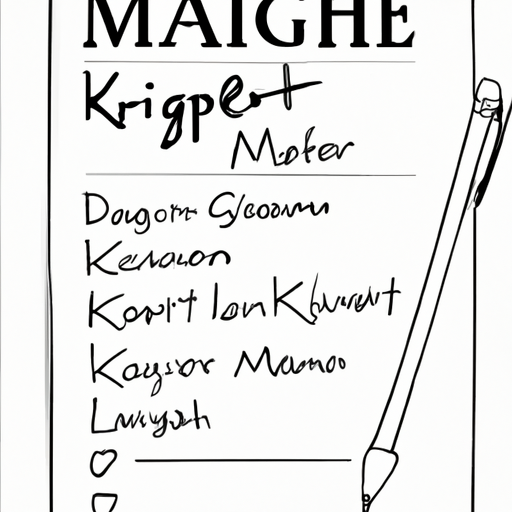The role of a kitchen manager is pivotal in ensuring the smooth and efficient operation of a culinary establishment. From overseeing food preparation and quality to managing staff and maintaining safety standards, the kitchen manager plays a crucial role in upholding the reputation and success of the establishment. In this comprehensive article, we will delve into the specific responsibilities, qualifications, and skills required for a kitchen manager, shedding light on the key aspects of this demanding yet rewarding position. Whether you are an aspiring kitchen manager seeking guidance or an employer looking to refine your understanding of the role, this article aims to provide valuable insights into the intricacies of the kitchen manager job description.
Table of Contents
- Responsibilities of a Kitchen Manager
- Key Skills and Qualifications Required for a Kitchen Manager
- Day-to-Day Duties and Tasks of a Kitchen Manager
- Importance of Effective Communication in Kitchen Management
- Ensuring Food Safety and Hygiene in the Kitchen
- Strategies for Managing Kitchen Staff and Promoting Teamwork
- Effective Inventory Management Techniques for a Kitchen Manager
- Implementing Cost Control Measures in Kitchen Operations
- Tips for Maintaining a Smooth and Efficient Kitchen Workflow
- Concluding Remarks

Responsibilities of a Kitchen Manager
A kitchen manager has a vital role in ensuring the smooth and efficient functioning of a restaurant’s kitchen. This position requires a strong blend of culinary expertise, leadership skills, and organizational abilities. As a kitchen manager, you will be responsible for:
- Overseeing all aspects of kitchen operations, including food preparation, cooking, and presentation.
- Managing and supervising kitchen staff, including scheduling shifts, training, and providing guidance to ensure high-quality performance.
- Monitoring and maintaining inventory levels to ensure adequate supplies are available at all times, while minimizing waste and controlling costs.
In addition, it is essential for a kitchen manager to uphold strict adherence to food safety and sanitation standards, ensuring a clean and well-organized kitchen environment. You will be responsible for implementing and enforcing proper kitchen procedures, while also collaborating with other departments to maintain a cohesive and efficient workflow within the restaurant. Your attention to detail and ability to multitask will be key in successfully managing kitchen operations and delivering exceptional dining experiences to our valued guests.

Key Skills and Qualifications Required for a Kitchen Manager
The role of a kitchen manager requires a unique set of skills and qualifications to effectively oversee the operations and ensure a smooth functioning of a busy kitchen. Here are some of the key skills and qualifications that are essential for this role:
- Leadership: A kitchen manager must exhibit strong leadership qualities and be able to effectively motivate and manage a diverse team of kitchen staff. This includes delegating tasks, providing guidance, and resolving conflicts in a professional and efficient manner.
- Organizational Skills: With numerous tasks and responsibilities, a kitchen manager must possess excellent organizational abilities. They should be adept at creating schedules, managing inventory, and coordinating orders to streamline kitchen operations.
- Knowledge of Food Safety Standards: Ensuring food safety and hygiene is of utmost importance in a kitchen. A kitchen manager should have a deep understanding of food safety regulations, including proper handling, storage, and preparation techniques. Implementing and enforcing these standards is crucial for maintaining a safe and healthy work environment.
- Menu Planning and Cost Control: Proficiency in menu planning, recipe development, and cost control is essential for a kitchen manager. They need to have a strong grasp of food cost calculations, portion control, and budgeting to maximize profitability without compromising on quality.
Additionally, excellent communication and time management skills, along with the ability to multitask and work well under pressure, are vital for a kitchen manager. A culinary education or relevant industry experience is often preferred for this role, as it demonstrates a solid foundation of culinary knowledge and expertise.

Day-to-Day Duties and Tasks of a Kitchen Manager
Kitchen Manager Job Description
In this post, we will explore the day-to-day duties and tasks that make up the role of a kitchen manager. The responsibilities of a kitchen manager are diverse and crucial, ensuring the smooth and efficient operation of a kitchen while maintaining high standards of quality and hygiene.
– **Menu planning and development:** One of the main tasks of a kitchen manager is to plan and develop menus that cater to the tastes and preferences of customers, while also considering dietary restrictions and budget constraints. This includes creating new dishes, researching and sourcing ingredients, and ensuring a balance of flavors and nutritional content.
– **Staff management:** As a kitchen manager, you will be responsible for managing and overseeing the kitchen staff, including hiring, training, and scheduling. This includes coordinating workflows, delegating tasks, and ensuring that the team operates effectively and efficiently. Providing guidance and support to staff members, as well as conducting performance evaluations, are also key aspects of this role.
– **Inventory and supply management:** It is essential for a kitchen manager to maintain accurate inventory records, monitor stock levels, and place orders for ingredients, supplies, and equipment as needed. This involves regular inventory checks, tracking expenses, and developing relationships with suppliers to ensure timely and cost-effective purchases.
– **Food safety and sanitation:** A kitchen manager plays a vital role in ensuring compliance with food safety and sanitation regulations. This includes implementing and enforcing proper hygiene practices, monitoring the storage and handling of ingredients, and conducting regular inspections to maintain a clean and safe working environment. Additionally, it is important to oversee proper equipment maintenance and coordinate with relevant health and safety authorities for inspections and certifications.
A successful kitchen manager must possess a strong attention to detail, excellent organizational and communication skills, and the ability to work well under pressure. By efficiently managing the day-to-day tasks and duties outlined above, a kitchen manager contributes to the overall success and reputation of the establishment.
Importance of Effective Communication in Kitchen Management
Effective communication in kitchen management is essential for the smooth operation of a culinary establishment. A kitchen manager plays a pivotal role in ensuring that communication flows seamlessly between the front and back-of-house staff, resulting in an efficient and productive work environment.
One of the key aspects of effective communication in kitchen management is the ability to clearly convey instructions and expectations to the kitchen staff. By providing precise instructions, the kitchen manager can ensure that each team member understands their tasks and responsibilities, leading to a higher level of efficiency and accuracy in food preparation and service. Furthermore, effective communication helps in setting goals and objectives, allowing the kitchen manager to align the team’s efforts towards achieving organizational targets.
In addition to conveying instructions, effective communication in kitchen management involves active listening and providing feedback. By actively listening to the concerns, ideas, and suggestions of the kitchen staff, the manager can foster a collaborative and inclusive work environment. Encouraging open communication channels enables the team to voice their opinions, address any challenges, and propose innovative solutions. Furthermore, providing constructive feedback helps in improving performance, enhancing skill development, and maintaining high-quality standards in the kitchen. Overall, effective communication in kitchen management is crucial for fostering a harmonious and efficient work environment, leading to customer satisfaction and organizational success.
Ensuring Food Safety and Hygiene in the Kitchen
As a Kitchen Manager, is one of your utmost responsibilities. Running a smooth and efficient operation requires maintaining pristine cleanliness standards and following proper food handling protocols. To fulfill this role, you must possess a comprehensive understanding of food safety regulations and apply them diligently in all aspects of kitchen operations.
Your duties will include:
- Supervising staff: Overseeing kitchen personnel to ensure they adhere to food safety guidelines, including proper handwashing, wearing gloves, and using hairnets or caps.
- Monitoring storage and preparation areas: Regularly inspecting refrigerators, freezers, and dry storage spaces to ensure they are clean, well-organized, and maintained at appropriate temperatures.
- Implementing sanitation procedures: Establishing cleaning schedules and protocols for kitchen equipment, utensils, and work surfaces. Ensuring routine sanitization activities are carried out.
- Conducting employee training: Providing comprehensive instruction on food handling, storage, and sanitation practices. Continuously educating staff on the latest food safety regulations and industry best practices.
In addition to these core responsibilities, you will need exceptional organizational skills to manage inventory effectively, ensuring that products are properly rotated and regularly checked for freshness. You will also play a vital role in conducting routine inspections and assessments to identify any potential hazards, rectify issues promptly, and maintain a safe and hygienic kitchen environment.
Strategies for Managing Kitchen Staff and Promoting Teamwork
Effective leadership in the kitchen is crucial for maintaining a smooth operation and ensuring high-quality food production. As a kitchen manager, your role extends beyond overseeing daily tasks; it involves managing the team and fostering a collaborative work environment. Encouraging teamwork among your staff not only increases productivity but also enhances morale and creates a positive workplace culture. Here are some key strategies to help you manage your kitchen staff effectively and promote a strong sense of teamwork:
- Lead by example: Set the bar high by demonstrating excellent work ethic, professionalism, and attention to detail. Show your team that you are fully committed to your role and hold yourself to the same standards you expect from them.
- Communicate openly: Establish clear channels of communication and encourage your staff to express their thoughts, concerns, and ideas. Regularly schedule team meetings to provide updates, exchange feedback, and address any issues proactively. Effective communication builds trust and ensures everyone is on the same page.
- Delegate responsibilities: Assign tasks and responsibilities to individual team members based on their skills and abilities. By delegating effectively, you empower your staff to take ownership of their work, boosting their confidence and motivation. However, ensure the workload is distributed fairly to avoid burnout or resentment.
Another strategy to promote teamwork is fostering a positive and inclusive work environment. Encourage collaboration and respect among your staff, regardless of their positions or experience levels. Create opportunities for team-building activities, such as organizing cooking challenges or team outings, to nurture stronger bonds and boost morale.
- Provide constructive feedback: Regularly assess your team’s performance and provide constructive feedback to help them improve. Praise their achievements and offer guidance on areas that need development. By providing feedback in a supportive and constructive manner, you show your commitment to their growth and success.
- Resolve conflicts promptly: Address any conflicts or disagreements within the team promptly and impartially. Act as a mediator to foster open discussions and find mutually agreeable solutions. Encourage your staff to approach you with any concerns, and handle conflicts with professionalism and discretion.
- Recognize and reward achievements: Acknowledge the hard work and achievements of your staff. Publicly recognize their efforts and celebrate milestones, whether it be completing a challenging task or receiving positive customer feedback. Small gestures of appreciation can go a long way in motivating and forging a strong team spirit.
Implementing these strategies will help you create a cohesive and motivated kitchen team while ensuring a productive work environment. By fostering teamwork and effective management, you will not only enhance the performance of your staff but also contribute to the overall success of your kitchen.
Effective Inventory Management Techniques for a Kitchen Manager
In order to excel at effective inventory management as a kitchen manager, it is crucial to implement proven techniques that streamline operations and maintain optimal stock levels. These techniques not only help control costs but also ensure that the kitchen is well-prepared to meet customer demands. Here are some highly effective strategies to enhance inventory management in a kitchen setting:
1. Utilize a robust inventory management system: Invest in a reliable inventory management software that can accurately track stock levels, monitor inventory movement, and help generate accurate reports. This will facilitate efficient ordering, prevent over and understocking, and identify any inventory discrepancies or losses.
2. Implement a first-in, first-out (FIFO) system: Adhere to the FIFO principle, which means utilizing the oldest stock first to avoid spoilage and wastage. Arrange items in order of their expiration or best-by dates, and train the kitchen staff to use ingredients accordingly. Regularly audit inventory to ensure compliance with this principle.
3. Establish par levels and reorder points: Determine par levels for each item in the kitchen inventory, which refers to the minimum quantity that should be available at any given time. Set reorder points to automatically prompt new orders when stock levels reach a specific threshold. This proactive approach ensures a continuous supply of essential ingredients and prevents the risk of running out of critical items.
4. Conduct regular inventory audits: Perform periodic physical inventory counts to validate the accuracy of recorded stock levels. Schedule these audits during less busy times to minimize disruptions. Identify and investigate any discrepancies found, and adjust records accordingly to maintain accuracy and prevent theft or losses.
By implementing these effective inventory management techniques, kitchen managers can optimize operations, reduce waste, and ensure smooth functioning of their culinary establishments.
Implementing Cost Control Measures in Kitchen Operations
Responsibilities:
- Develop and implement cost control measures to ensure efficient and profitable kitchen operations.
- Analyze and monitor food and beverage costs, recommending and implementing strategies to reduce expenses without compromising quality.
- Collaborate with the executive chef and other team members to establish standard portion sizes and recipes to minimize waste and maximize profitability.
- Research and negotiate with suppliers to obtain the best prices for ingredients without compromising quality standards.
- Regularly review inventory levels and stock rotation to minimize waste and spoilage.
- Monitor labor costs by creating efficient schedules and ensuring staff productivity while maintaining high quality standards.
Qualifications:
- Prior experience as a kitchen manager or similar role in a high-volume establishment.
- In-depth knowledge of kitchen operations and culinary techniques.
- Strong analytical skills and ability to identify opportunities for cost savings.
- Excellent organizational and time management abilities.
- Proficient in MS Excel or similar software for cost analysis and reporting.
- Exceptional communication and leadership skills to effectively coordinate with food and beverage staff.
- Understanding of health and safety regulations and ability to ensure compliance.
Tips for Maintaining a Smooth and Efficient Kitchen Workflow
Maintaining a smooth and efficient kitchen workflow is essential for any kitchen manager. To excel in this role, it is crucial to establish proper systems and implement effective strategies. Here are some valuable tips to help you successfully manage a kitchen and ensure everything runs seamlessly:
1. Organization: Place a strong emphasis on organization to minimize chaos and maximize productivity. Keep all ingredients, utensils, and equipment properly labeled and stored in designated areas. Implement a clear inventory management system to track stock levels and prevent shortages. This will enable your team to easily locate items, saving time and preventing delays.
2. Communication: Effective communication is the key to maintaining a smooth kitchen workflow. Clearly communicate expectations, responsibilities, and deadlines to your staff. Encourage open communication and active listening within the team. Regularly conduct team meetings to discuss any challenges, provide updates, and address concerns. This fosters a collaborative environment and ensures everyone is on the same page.
Concluding Remarks
In conclusion, the role of a kitchen manager plays a vital part in ensuring the smooth operation and efficiency of a culinary establishment. With a myriad of responsibilities ranging from supervising staff and maintaining inventory, to overseeing food safety and optimizing kitchen operations, this position requires a unique skill set and a strong attention to detail. By carefully balancing leadership, organization, and culinary expertise, the kitchen manager serves as the backbone of a successful kitchen, ensuring customer satisfaction and maintaining the highest quality standards. To pursue a career as a kitchen manager is to embark on a challenging yet rewarding journey where precision, adaptability, and effective communication are key. So, if you have a passion for the culinary arts and possess the necessary managerial skills, the role of kitchen manager might just be the perfect fit for you.
